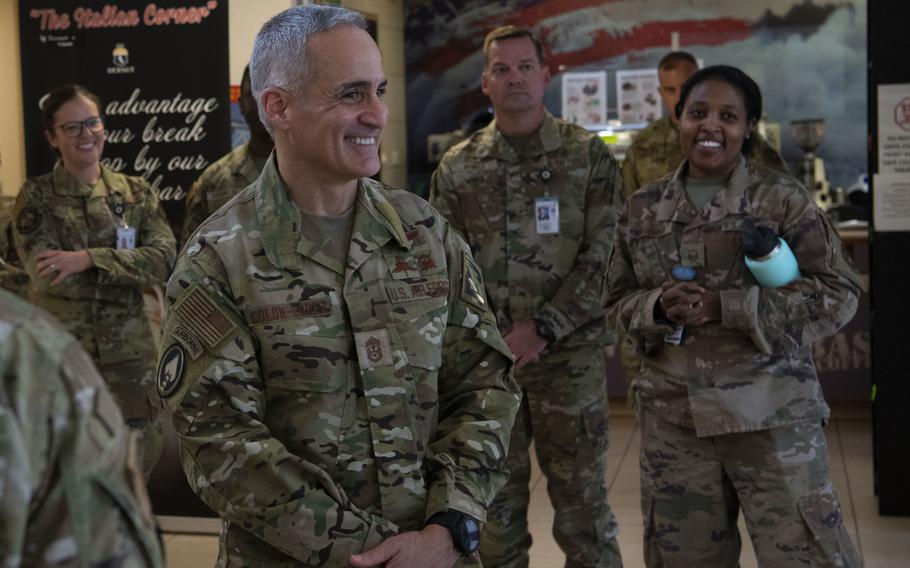
Ramón “CZ” Colón-López, the senior enlisted adviser to the chairman of the Joint Chiefs of Staff, speaks Oct. 12, 2022, with airmen at the 31st Medical Group at Aviano Air Base, Italy. (Thomas Calopedis/U.S. Air Force)
WASHINGTON — The most senior non-commissioned officer in the armed forces said Tuesday that to overcome a highly competitive recruiting climate, more young Americans need to be told why military service is better than a regular job, and the message needs to start coming from outside the Pentagon.
“We need to rely on outside entities to be able to propagate [our] message,” Ramón “CZ” Colón-López, the senior enlisted adviser to the chairman of the Joint Chiefs of Staff, said during an Air & Space Forces Association event near Washington. “What I mean by that is the use of influencers.”
Colón-López said social media channels such as YouTube and TikTok are dominated by popular influencers who have a service connection. He said they are precisely what the military needs to reach potential recruits under the age of 25, considering recent Pentagon data has shown just 23% of Americans between the ages of 17 and 24 qualify physically and academically to serve. Further, only about 9% of people in that age range are interested in serving, according to a Defense Department survey.
“We have people who have very wide-casted nets out there with big followings who have some kind of connective tissue with the Department of Defense,” Colón-López said. “Those are the experiences we need people to start talking about.”
In response to the reduced candidate pool, the military services have made numerous efforts recently to improve recruiting, such as offering cash bonuses, choice of duty station, official decorations and expedited American citizenship for non-citizens who enlist. But, once again, Colón-López said the Pentagon needs external help.
“We need to communicate with the … film industry, the TV industry to give us a little bit more leeway to go ahead and highlight the good of serving in the military,” he said. “Those are a few examples of what we need to do with this recruiting effort.”
A few months ago, the Army invested heavily in rebranding its public image and returned to its famous “Be All You Can Be” slogan — even bringing in a Hollywood actor as a pitchman and buying airtime to run commercials during the NCAA basketball tournament in March. The Army missed its recruiting target by 15,000 in 2022, and the service has already said it expects to come up short again with this year’s goal of 65,000.
The Air Force and Navy have similarly encountered trouble recruiting lately. Leaders for both services said recently that they also expect to miss their recruiting targets in 2023 by several thousand troops each. The Marine Corps, meanwhile, has said it will meet its target this year of 33,000 recruits.
Another major problem for military recruiting in recent years is competition from the private sector, Pentagon officials have said. In June, a National Guard recruiter said private companies are getting tougher in competing for young workers — especially companies that offer perks the military cannot, such as better pay and fully remote work. Colón-López said the military needs to tailor its messaging to underscore the benefits of serving that private companies can’t provide.
“The one thing [young people] will not get working at Netflix or Starbucks … is a sense of purpose. When you have your grandchild on your lap, how much are you going to talk about the great coffee you make?” he asked. “Where are you going to have the best opportunity to do something that’s going to impact the lives of many across the globe?”
Some of the other advantages in the military, Colón-López said, include a superior health care system, debt-free college education with the G.I. Bill and worldwide travel.
“Not only do you get free education, but you also … get a skill. You get a trade that you may be able to use someday outside — and credibility to boot,” he said. “You get exposed to so many cultures … and also to a global environment that’s foreign to a lot of people who never travel.”
A native of Puerto Rico, Colón-López joined the Air Force in 1990 and has been in posts around the world. He became senior enlisted adviser to the chairman of the Joint Chiefs, Army Gen. Mark Milley, in December 2019. In the job, he’s the most senior non-commissioned officer in the U.S. military and serves as Milley’s top adviser and representative on issues related to enlisted personnel.
Colón-López is scheduled to retire in November and will be succeeded by Marine Corps Sgt. Maj. Troy Black. Milley will retire Sept. 30 and is expected to eventually be replaced by Gen. Charles Brown, the Air Force chief of staff.